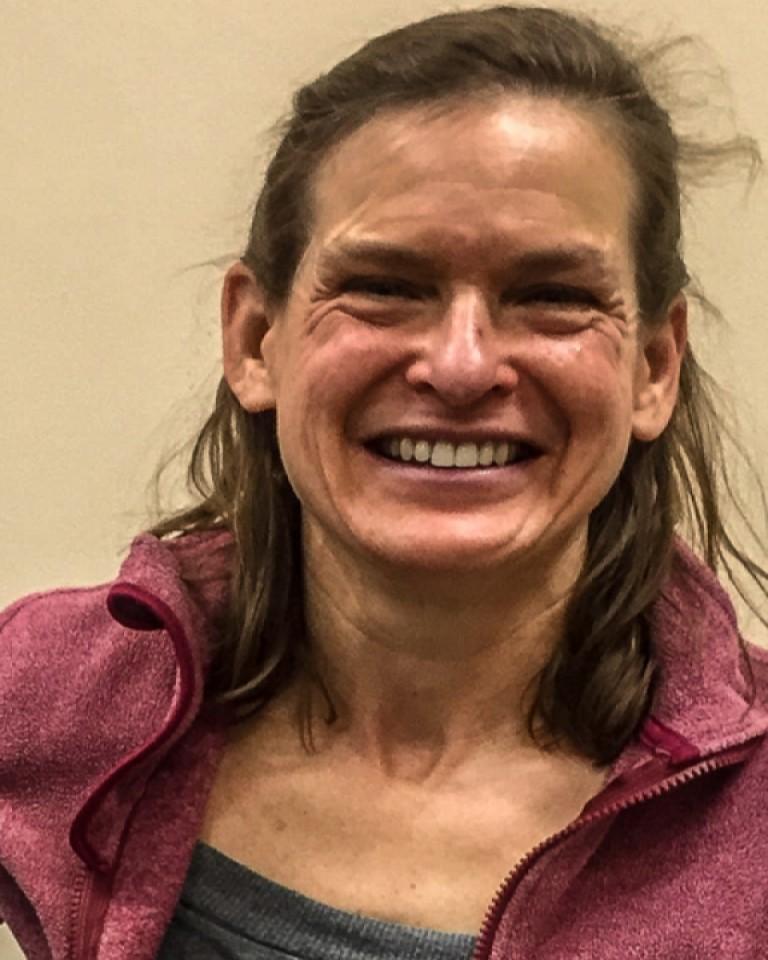Maria Eifler

MENTOR SPOTLIGHT | MARCH 2018
Department: Biodiversity Institute, Mammal Division
Describe your work in a few sentences that we can all understand: I study the behavior and ecology of vertebrates, primarily lizards and often the desert. I focus on aspects of how they move and use space (movement ecology) as well as on foraging and social behavior. I often have undergraduates accompany me as part of their first exposure into independent research.
Q: How did you first get interested in doing research?
A: I have always wanted to work with animals, and doing research has simply been a way for me to find answers to the many questions that float around in my head. I was able to begin doing research in animal behavior as an undergraduate working in zoos and labs, and then began doing my own field research as a graduate student.
Q: What do students in your discipline learn by doing research that they wouldn’t learn by just taking classes?
A: The best part about research is helping the students take abstract ideas they’ve learned in classes and make them real. During field work, concepts become concrete to the students and they are able to develop a real sense of the challenges wild animals face. From the very start of a field project, students begin to integrate ideas, formulate their own questions, and develop new insights into science and nature.
Q: What do you find to be the most exciting part of doing research or creative work? What makes this line of work meaningful and interesting to you?
A: The overall motivator behind my research is that I want to know how animals perceive and respond to their world, and why particular components of the environment are important to them. I take great pleasure in not only figuring out how the pieces of an animal’s world fit together through finding the answers to my own research questions, but also by watching the students I work with grow and develop during the research excursion. Their ideas and experiences synergistically stimulate new ideas and an appreciation of the system we are working. On a smaller scale, not a single field season passes without some kind of truly amazing outdoor experience, whether centered on the physical (like climbing to a peak to watch the sunset or hiking through a river at flood stage) or animal-related (like seeing a manta ray while snorkeling, watching a lizard leap to snatch an insect in flight, or flushing a Golden Eagle during a hike).
Q: What advice do you have for undergraduates interested in doing research in your field?
A: Research in field biology requires a love of the outdoors, and a tolerance for all that goes with that (especially heat in the desert). Doing research in behavior requires patience and a good attention to details. If you have those things, then your natural curiosity will drive your research ideas. Be creative with how you approach problems and persistent in finding opportunities to let you follow through with your interests.
Q: For many students, doing research or a larger creative project is the first time they have done work that routinely involves setbacks and the need to troubleshoot problems. Can you tell us about a time that your research didn’t go as expected? Or about any tricks or habits that you’ve developed to help you stay resilient in the face of obstacles?
A: Field work is much less predictable than lab work. Even after spending weeks or months doing background readings and preparations, we often have to adjust our project plans after arriving at a field site. Although plans do not always play out as expected, by talking problems over with the group, we invariably end up with a solid project that interests everyone. The students that are most flexible in their thinking, cooperative, and open to new ideas become excited by the “thinking on your feet” that comes with field research. In addition, when collecting data, errors are always a possibility; the students who honestly and openly convey their mistakes successfully turn them into learning opportunities.
Q: How do you spend your time outside of work?
A: I do everything I can to find ways to be active outdoors. I go birding often, and am an avid trail runner. I also enjoy biking, swimming, and rock climbing. Quieter activities include going for long walks with my dog, doing yoga, and reading.